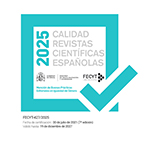Poder, tradición e historia del arte: Apariencia desnuda. La obra de Marcel Duchamp
Resumen
After the Tlatelolco massacre in 1968 Octavio Paz left the Mexican embassy in India and became a cultural leader in Mexico. This paper relates his cultural leadership and the poet’s research and writings about Marcel Duchamp between 1968 and 1978. His vindication of the figure of the French artist in the 70s in Mexico pushed Octavio Paz to defend an experimental and modern aesthetics, based on the artist’s freedom and the values of romantic and avant-garde tradition in a difficult moment for Mexican official culture. Octavio Paz analysed the concepts of creativity, modern artist, tradition and translation in order to create a new cultural discourse opposed to the Mexican society of the 70s.Descargas
Descarga artículo
Licencia
La revista Anales de Historia del Arte, para fomentar el intercambio global del conocimiento, facilita el acceso sin restricciones a sus contenidos desde el momento de su publicación en la presente edición electrónica, y por eso es una revista de acceso abierto. Los originales publicados en esta revista son propiedad de la Universidad Complutense de Madrid y es obligatorio citar su procedencia en cualquier reproducción total o parcial. Todos los contenidos se distribuyen bajo una licencia de uso y distribución Creative Commons Reconocimiento 4.0 (CC BY 4.0). Esta circunstancia ha de hacerse constar expresamente de esta forma cuando sea necesario. Puede consultar la versión informativa y el texto legal de la licencia.












